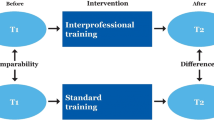Abstract
Objective
This article describes an evaluation of a curriculum approach to integrating interprofessional education (IPE) in collaborative mental health practice across the pre- to post-licensure continuum of medical education.
Methods
A systematic evaluation of IPE activities was conducted, utilizing a combination of evaluation study designs, including: pretest-posttest control group; one-group pre-test-post-test; and one-shot case study. Participant satisfaction, attitudes toward teamwork, and self-reported teamwork abilities were key evaluative outcome measures.
Results
IPE in collaborative mental health practice was well received at both the pre- and post-licensure levels. Satisfaction scores were very high, and students, trainees, and practitioners welcomed the opportunity to learn about collaboration in the context of mental health. Medical student satisfaction increased significantly with the introduction of standardized patients (SPs) as an interprofessional learning method. Medical students and faculty reported that experiential learning in practice-based settings is a key component of effective approaches to IPE implementation. At a post-licensure level, practitioners reported significant improvement in attitudes toward interprofessional collaboration in mental health care after participation in IPE.
Conclusion
IPE in collaborative mental health is feasible, and mental health settings offer practical and useful learning experiences for students, trainees, and practitioners in interprofessional collaboration.
Similar content being viewed by others
References
Reeves S, Freeth D, Glen S, et al: Delivering practice-based interprofessional education to community mental health teams: understanding some key lessons. Nurs Educ Pract 2006; 6:246–253
World Health Organization Study Group on Interprofessional Education and Collaborative Practice: Framework for Action on Interprofessional Education & Collaborative Practice. Geneva, Switzerland, World Health Organization, 2010; available at: http://www.who.int/hrh/resources/framework_action/en/index.html
Priest HM, Roberts P, Dent H, et al: Interprofessional education and working in mental health: in search of the evidence base. J Nurs Manag 2008; 16:474–485
Craven MA, Bland R: Better practices in collaborative mental health care: an analysis of the evidence base. Can J Psychiatry 2006; 51(suppl. 1):1S–72S
Gagne MA: What is Collaborative Mental Health Care? An Introduction to the Collaborative Mental Health Care Framework. Mississauga, ON, Canadian Collaborative Mental Health Initiative, 2005; accessed Nov 23, 2007, from http://www.ccmhi.ca
Pauzé E, Gagné MA: Collaborative Mental Health Care in Primary Health Care: A Review of Canadian Initiatives, Volume II: Resource Guide. Mississauga, ON, Canadian Collaborative Mental Health Initiative, 2005; accessed Nov. 23, 2007, from http://www.ccmhi.ca.
Pawlenko N: Collaborative Mental Health Care in Primary Health Care Across Canada: A Policy Review. Mississauga, ON, Canadian Collaborative Mental Health Initiative, 2005; accessed Nov 23, 2007, from www.ccmhi.ca.
Hammick M, Freeth D, Koppel I, et al: A best-evidence systematic review of interprofessional education. Med Teach 2007; 29:735–751
Reeves S: A systematic review of the effects of interprofessional education on staff involved in the care of adults with mental health problems. J Psychiatr Ment Health Nurs 2001; 8:533–542
Carpenter J, Barnes D, Dickinson C, et al: Outcomes of interprofessional education for community mental health services in England: the longitudinal evaluation of a postgraduate programme. J Interprof Care 2006; 20:145–161
Curran VR, Sharpe D: A framework for integrating interprofessional education curriculum in the health sciences. Educ Health 2007; 20(3); available from http://www.educationforhealth.net/
Miller C, Freeman M, Ross N: Interprofessional Practice in Health and Social Care: Challenging the Shared Learning Agenda. London, UK, Arnold, 2001
Frank JR (ed): The CanMEDS 2005 Physician Competency Framework: Better Standards, Better Physicians, Better Care. Ottawa, Canada, The Royal College of Physicians and Surgeons of Canada, 2005
Curran VR, Heath O, Kearney A: Evaluation of an interprofessional collaboration workshop for post-graduate residents, nursing, and allied health professionals. J Interprof Care 2010; 24:315–318
Heath O, Cornish P, Callanan T,et al: Building interprofessional primary care capacity in mental health services in rural communities in Newfoundland and Labrador: an innovative training model. Can J Commun Ment Health 2008; 27:165–178
Heinemann G, Schmitt M, Farrell P, et al: Development of an Attitudes Toward Health Care Teams scale. Eval Health Prof 1999; 22:123–142
Hepburn K, Tsukuda RA, Fasser C: Team Skills Scale, in Team Performance in Healthcare: Assessment and Development. Edited by Heinemann GD, Zeiss AM. New York, Kluwer Academic/Plenum Publishers, 2002, pp 159–163
Curran VR, Sharpe D, Forristall J, et al: Attitudes of health sciences students toward interprofessional teamwork and education. Learn Health Soc Care; 2008; 7:146–156
Clark PG: Learning on an interdisciplinary gerontological team: instructional concepts and methods. Educ Gerontol 1991; 20:349–364
Church E, Heath O, Curran V, et al: Rural professionals’ perceptions of interprofessional continuing education in mental health. Health Soc Care Community 2010; 18:433–443
Cornish PA, Church E, Callanan T, et al: Rural interdisciplinary mental heath team-building via satellite: a demonstration project. Telemed J E Health 2003; 9:63–71
Barnsley L, Lyon PM, Ralston SJ, et al: Clinical skills in junior medical officers: a comparison of self-reported confidence and observed competence. Med Educ 2004; 38:358–367
Author information
Authors and Affiliations
Corresponding author
Rights and permissions
About this article
Cite this article
Curran, V., Heath, O., Adey, T. et al. An Approach to Integrating Interprofessional Education in Collaborative Mental Health Care. Acad Psychiatry 36, 91–95 (2012). https://doi.org/10.1176/appi.ap.10030045
Received:
Revised:
Published:
Issue Date:
DOI: https://doi.org/10.1176/appi.ap.10030045




